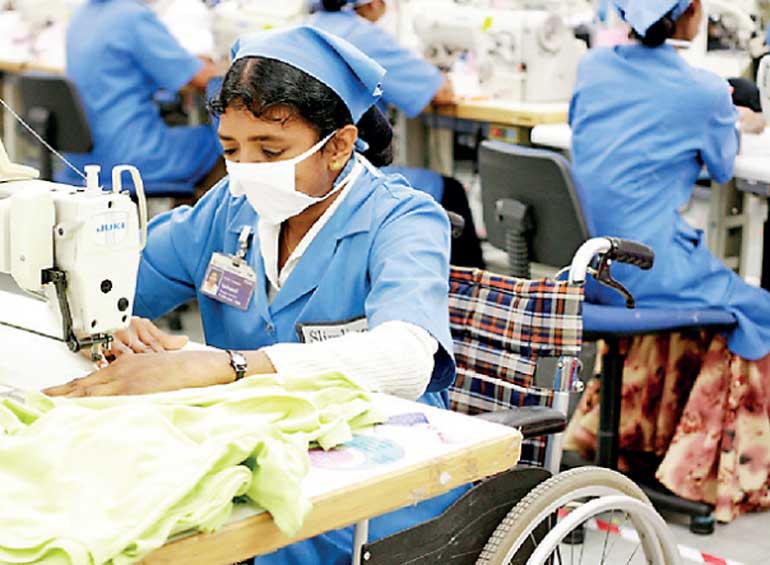Monday Feb 23, 2026
Monday Feb 23, 2026
Friday, 12 May 2017 00:00 - - {{hitsCtrl.values.hits}}
 The EU is Sri Lanka’s biggest export market accounting for nearly one-third of the country’s global exports with apparel being the leading product
The EU is Sri Lanka’s biggest export market accounting for nearly one-third of the country’s global exports with apparel being the leading product
The European Union has formally restored the GSP+ concessions to Sri Lanka seven years after key beneficiary access to the country’s biggest export market was suspended.
The Government’s Information Department said last night that the European Union (EU) Foreign Affairs Council had approved GSP plus for Sri Lanka.
The Department said the EU approval completes the three procedural requirements for Sri Lanka to receives GSP Plus status. "The official notification on the entry into force will be finalised next week," it added.
Sri Lanka last month secured a crucial vote at the European Parliament in Brussels and Sri Lanka’s application was referred to the 28-member European Union Council of Ministers for approval.
In granting the GSP+ facility, the EU’s Foreign Affairs Council said Sri Lanka has ratified and implemented measures contained in a number of international conventions on human and labor rights, environment protection and good governance.
“On this basis, Sri Lanka has become eligible to receive additional tariff preferences for sustainable development and good governance, in addition to the generalized scheme of tariff preferences benefitting to all developing countries,” the Council said.
The EU is Sri Lanka’s biggest export market accounting for nearly one-third of Sri Lanka’s global exports. In 2015, total bilateral trade amounted to Euro 4.7 billion. EU imports from Sri Lanka amounted to euro 2.6 billion and consisted mainly of textiles as well as rubber products and machinery. The concessions are particularly valuable to the apparel, rubber products and ceramics industries.
“It is a great win for the Government and for the people of Sri Lanka,” Foreign Affairs Deputy Minister de Silva told the Daily FT last night.
He assured that within the next two weeks Sri Lanka could export some 6,600 products to the EU market without any tax and called on the business community to make this a “turning point” for economic prosperity.
“Regaining GSP+ calls on Sri Lanka to open up further to attract foreign direct investments (FDIs) in order to diversify our export basket. We need to change our export basket from being buyer-driven to producer-driven to reap the best from this opportunity,” he pointed out.
With approval coming during a period when the Government was working on multiple foreign trade agreements as well as when large foreign investors were looking at Sri Lanka, Dr. de Silva said it was time that the country seized this opportunity to turn around the economy once again into a strong regional player in the Indian Ocean.
“There are large investors looking at opportunities in Sri Lanka. The Inland Revenue Act, which will come into effect soon, will set out new opportunities for investors. The Chinese investment zone in Hambantota will soon begin to take shape and the Free Trade Agreement (FTA) with Singapore will be finalised in the next couple of months. So everything is moving in the right direction,” Dr.de Silva added.
In April when Sri Lanka secured the EU Parliamentary vote Dr. de Silva said: “Sri Lanka overcame the biggest hurdle.” He also expressed confidence in securing final approval, which had been communicated last night to the Government.
The motion against Sri Lanka’s application in the EU Parliament in April was defeated by 436 votes against and 119 in favour with 22 abstentions.
The EU withdrew the coveted tariff concessions from Sri Lanka in 2010 in the face of the country’s deteriorating human rights record and failure to comply with its international human rights obligations under the administration of President Mahinda Rajapaksa. After President Rajapaksa’s defeat at the 2015 presidential elections, the new Government reapplied for the import duty concession.
EU Ambassador Tung-Laï Margue, in his message to mark Europe Day 2017 which fell on 9 May, said Sri Lanka’s renewed commitment to respecting international rule of law and upholding its international human rights, labour rights and environmental obligations has resulted in the European Commission recommending the reinstatement of GSP+.
“Getting there took many hours of intense collaboration between Sri Lanka and the EU, as together we examined Sri Lanka’s compliance with the 27 international conventions on which the GSP+ assessment is based. I hope that our colleagues in the Member States and in the European Parliament will soon indicate that they are happy for readmission to take place,” he said.